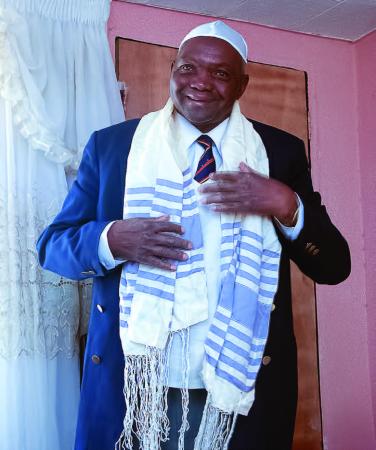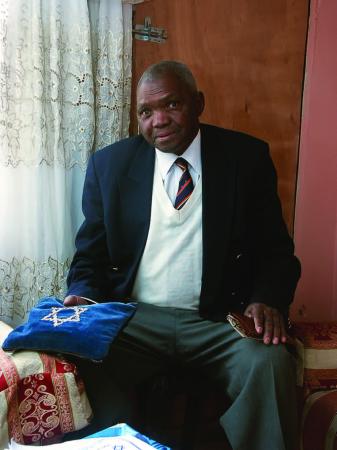Some black South Africans claim that they are descendants of a “lost tribe” of the Children of Israel. US-based writer Judith Fein went to Soweto in search of their story. And while scholarly opinion is divided on the matter of the Lemba tribe’s connection to the Jewish People, she believes it is strong.
By Judith Fein
I can remember the first time I heard of them, about fifteen years ago. The Lemba. The black “Jews” of South Africa.
I asked a Jewish friend from South Africa if he knew anything about them.
“Sure, “ he said. “We had a nanny working in our house. She was from the Lemba tribe.”
“They’re Jewish,” I told him.
“What? That’s nuts. No way. Check your sources. “
“They’re Jewish,” I told him.
“What? That’s nuts. No way. Check your sources. “
I did check my sources. I read a book about them, saw a documentary, and decided that I really wanted to meet these ancient people, whose oral tradition spoke of an ancestral home in Sena, which is today thought to be in Yemen.
Several years ago, when I was in Johannesburg, I connected with a woman who knew some Lemba, and soon I had the phone number of a Lemba man in Soweto, the township once known as the hotbed of anti-apartheid revolution. His name was Edwin Mabudafhasi, and he invited me to his house.
The following day, I was riding in the back of an SUV, scanning the streets, looking for Edwin’s address. She stopped in front of a small house where Edwin, a smiling, kindly, 71-year-old man, was waiting outside for me. Next to him were half a dozen sofas, which he reupholstered to eke out a living.
“Come in, come in,” he said, as he led me into his modest living room. He spoke English in addition to his native Venda and about five other African languages. As I sat down, I noticed a cushion embroidered with the name Jesus Christ.
“Are you…Jewish?” I asked Edwin.
“Are you…Jewish?” I asked Edwin.
He explained that like many blacks under the apartheid regime, he was forced to attend a Christian missionary school and be baptized if he wanted to be educated.
“But we know who we are,” said Edwin. “Like the Ethiopians, we are the lost tribes of Israel.”
Edwin went into the back room of his house and emerged wearing a tallith. Then he dragged out a huge plastic bag filled with yarmulkes and prayer shawls. “These were gifts from Jews in Israel and the USA,” he explained.
As he set the bags on the sofa, several yarmulkes fell out and the fringes of the prayer shawls trailed on the floor. I gently explained to Edwin that these were sacred objects, and he immediately gathered
them up. It occurred to me that Edwin is Jewish, but he was not raised a Jew. And even the Lemba who were raised Jewish did not share customs such as wearing yarmulkes, laying tefillin, and wearing prayer shawls. They had their own traditions, Edwin said, “such as animal sacrifice, ritual slaughter, not eating pork, and the Ngoma Lungundu.” The latter, he explained, was an ancestral drum, that accompanied the Lemba on their trek from Sena
and was said to fortify them and protect them during times of war and turbulence. The drum is now lost, but its importance has been compared to the Ark of the Covenant.
At Edwin’s family home in the northern Limpopo region (where most of the Lemba live), there has been much more cultural and religious continuity, but for urban Lemba, who came to Johannesburg to work in horrible conditions in the mines, the customs were broken.
“We know who we are now,” said Edwin, “and we want to return to our Jewish roots…but the Orthodox do not accept us. They tell us that we were raised as Christians and we are not considered Jews.”
The door of Edwin’s house opened, and a handsome, twenty-two year old man named Solly entered. He said he was Jewish, but he had no idea of what that meant. Edwin brought out a stack of books that non-Orthodox rabbis and Jews had sent to him, but they were all much too advanced or scholarly for Edwin or Solly. They couldn’t relate to the texts.
I picked up a bound volume called “The Torah.” I had an idea. I asked young Solly to close his eyes, and told him I wanted to read him an African story. He sat on Edwin’s sofa with his eyes shut, and I began to read the story of Jacob, Rachel and Leah. Solly was mesmerized. When he opened his eyes, he said he was going to start reading the stories of his Jewish people. “I want to know what it means to be Jewish,” he said, with great sincerity.
Because of a paucity of identifiable Jewish practices, books and historical documents (their tradition is oral), many white, mainstream Jews refused to accept that the 12 clans of the Lemba are Jews. But DNA testing has confirmed not only Semitic and Middle Eastern heritage in the general Lemba population, but the presence of the Cohen or priestly gene in more than 50 per cent of the men of the Buba clan. This still isn’t acceptable to most rabbis. Some reject the DNA tests and say they don’t prove conclusively that the Lemba are Jews. They argue that if the Lemba were raised as Christians and they aren’t actively practicing the Jewish religion, they aren’t Jews and they have to convert to be accepted.
A few days later, at the Holiday Inn hotel in Sandton where I was staying, I nursed a pot of tea and spoke with Rudo Mathivha, the 43-year-old daughter of the late Lemba leader Professor Matshaya Mathivha. Rudo had the benefit of a lot of instruction and education from her father and relatives in Limpopo. Not only is she the head of pediatric intensive care at one of Johannesburg’s biggest hospitals, but she is also an avid student of Judaism.
Rudo said that the Lemba elders used to speak of a book of laws that was lost a long time ago, so the laws and traditions were passed on orally. “I always knew I was Jewish,” said Rudo. “We had special dietary laws — our meat had to be slaughtered in a particular way and the blood was drained, circumcision was a very important occasion, we had a Sabbath that began on Friday evening with prayers. After the prayers, someone walked around with a clay pitcher and a bowl and we washed with clean water that was poured over our hands. Then
we used a clean towel to dry our hands”.
She said the Lemba Jewish religion was “very patriarchal, also patrilineal, and men could not convert in.” Women who converted and married Lemba had to be instructed in dietary laws, and they had to learn Lemba ways.
Rudo began to reminisce about her childhood. “On Pesach,” she began, “we slaughtered a lamb, ate a flat, dry bread and greens that were slightly bitter. We told the story of the slavery in Egypt very quickly, and then we told our oral history, from Sena on down. My father could recite the generations back to Seremane, which probably
means Solomon.”
When I asked Rudo how she felt about the rejection of the Lemba as Jews, she knit her brows and her jaw tightened, and she said that the Jewish establishment should accept them.
“Rudo,” I asked her, “what is the Lemba name for God?”
“Mwari,” she answered.
“Mwari,” she answered.
I went to an internet cafe and wrote an e-mail to Benyamim Tsedaka, a Samaritan scholar who speaks ancient Hebrew, Aramaic, modern Hebrew and English. I asked him if the word “mwari” meant anything to him. His answer was startling.
“Maybe the bell is starting to ring,” he wrote back. “As for the word ‘mwari,’ the nearest form I can think of is in Samaritan Aramaic. ‘Mari’ means “My God.”
I saw Rudo again while I was in Johannesburg, and I spoke to Edwin on the phone. None of the South African Jews I met (besides the woman who connected me to Edwin) had ever encountered a Lemba. Several of them were really curious to do so, but they were skittish about going to Soweto alone. There is no synagogue in Soweto, no Jewish cultural center, and no ongoing instruction. There is no obvious place for South African Jews to meet the Lemba, who are dispersed throughout South Africa and Zimbabwe. Several rabbis and concerned Jews have gone to South Africa to give workshops for the Lemba, but the few-day workshops don’t solve the problem. There needs to be continuity in teaching, so the Lemba who wish to can really learn about Judaism.
If you travel to South Africa, perhaps Thuli can take you to meet Edwin or other Lemba. It’s a chance for you to open your heart to our long-lost brothers and sisters. You’ll love Soweto, which is dynamic, fascinating, and now courting tourists. I hope that, over time, the Lemba who want to practice Judaism and belong to the mainstream will have the education and the opportunity to do so.
Judith Fein is an award-winning international travel journalist who has contributed to more than 100 publications. She is the author of Life Is A Trip: The Transformative Magic Of Travel and the new The Spoon From Minkowitz: A Bittersweet Roots Journey To Ancestral Lands. Her website is: www.globaladventure.us
Travel Advice for South Africa
Thuli, a Zulu tour operator who offers fascinating visits to Soweto can, if previously arranged, take you to meet some of the Lemba who live there. Atamela@webmail.co.za
In beautiful Capetown, be sure to visit the high-tech, interactive South African Jewish Museum, which contains a wonderful reconstructed Lithuanian shtetl and exhibits about the role Jews played in South Africa.
Travel Advice for South Africa
South Africa Airways offers non-stop flights and has many special deals: www.flysaa.com
Thuli, a Zulu tour operator who offers fascinating visits to Soweto can, if previously arranged, take you to meet some of the Lemba who live there. Atamela@webmail.co.za
In beautiful Capetown, be sure to visit the high-tech, interactive South African Jewish Museum, which contains a wonderful reconstructed Lithuanian shtetl and exhibits about the role Jews played in South Africa.
www.sajewishmuseum.co.za
The world-class, boutique Cape Grace Hotel in Capetown, sent a home-made apple-andhoney tart to my room on Rosh Hashanah.
www.capegrace.com

